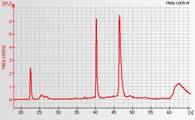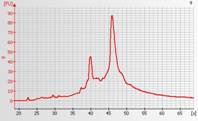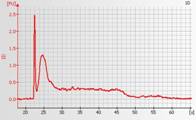home
 services
services  quality control
quality control  agilent 2100 bioanalyzer
agilent 2100 bioanalyzer
The Agilent 2100 Bioanalyzer is available for the sizing, quantification and quality control of RNA and protein samples.
RNA samples:
High quality total RNA is essential for successful microarray experiments. The Agilent 2100 Bioanalyzer uses microfluidics to analyse each sample and provides a RNA Integrity Number (RIN), quantitation estimate, and ribosomal ratio (28S/18S rRNA). The easy-to-interpret RIN enables researchers to estimate the integrity of total RNA samples. The RIN is determined by the entire electrophoretic trace of the RNA sample, unlike the RNA ratio. Learn more about the RIN. For total RNA analyses, we offer the RNA Nano (requires 100-200 ng/µL total RNA) and RNA Pico (5-10 ng/µL) kits. Although the assays require 1 µL of sample, we request that more be submitted, if possible, to allow for repeats.
To submit RNA samples for analysis on the Bioanalyzer, please print and complete the checklist and form
Protein samples:
For protein analyses, we offer the Protein 230 (for proteins between 14-230 kDa) and Protein 80 (for proteins between 5-80 kDa) kits, which can detect proteins (including cell lysate, column fraction, antibody or purified protein) at concentrations between 0.1-2 µg/µL, and the High Sensitivity Protein 250 kit (for proteins 10-250 kDa) which can detect proteins at lower concentrations (>10 pg/µL). Each chip provides size, purity and concentration information for ten samples. The assays require 4 µL of sample, we request that more be submitted, if possible, to allow for repeats.
To submit protein samples for analysis, please print and complete checklist and form
Please ensure that the concentration of your sample is within the specified range, as indicated on the checklist. Frozen samples can be sent to our lab between 9am - 4pm, Monday to Friday, excluding holidays.
To learn more about the Agilent 2100 Bioanalyzer, please visit Agilent's website.
Cost: RNA and protein assays cost $10 per sample
Turnaround time: typically 2-3 business days, results sent via email the same day they are analysed
Note: If the request for analysis is urgent, we will try to accommodate users who have submit enough samples to fill a chip.
Contact:
Quick questions:
 Expand all
Expand all
 Hide all
Hide all
- How much total RNA is required for analysis?
-
Bioanalyzer kit Amount requested Concentration range RNA Nano 2-3 µL total RNA in RNase-free water 100-200 ng/µL RNA Pico 2-3 µL total RNA in RNase-free water 5-10 ng/µL If you do not know the concentration of your sample, you will be charged for running the sample even if the concentration is too low to detect. We kindly ask that you dilute concentrated samples accordingly as high concentrations can cause problems with the assay.
- How much protein is required for analysis?
-
The Protein 230 and Protein 80 kits require 4 µL of sample at a concentration between 0.1-2 µg/µL. The High Sensitivity 250 kit requires 4 µL of sample with a concentration >10 pg/µL, which is superior to silver stain SDS-PAGE. .
- What else can be analysed using the Bioanalyzer?
-
The Agilent Bioanalyzer can also be used to measure mRNA, amplified RNA, labelled-cDNA, and other nucleic acids, however, the standard service we are offering currently applies to total RNA only. If you have specific needs, please contact us.
- What is the advantage of analysing my RNA on the Bioanalyzer?
-
Assessing the quality of your RNA sample before proceeding with labelling, etc, can save a lot of time and money. It can also reduce the time spent troubleshooting if something goes wrong at the next step. If you know your RNA was good, you can rule out degraded RNA as the cause of your problem.
The Agilent Bioanalyzer is a convenient replacement for standard denaturing agarose gels; it is much faster, requires only a small amount of sample, and is more environmentally-friendly. The Bioanalyzer uses capillary electrophoresis (lab-on-a-chip technology) to move the sample through a gel matrix. An intercalating dye in the matrix allows the nucleic acid to be detected as it moves through the capillary. The electropherogram provides the user with a detailed trace of each sample. - Which protein buffers are compatible with the Agilent 2100 Bioanalyzer?
For a list of compatible buffers, please visit Agilent's site which lists all known compatible buffers.
- Can the protein assays be run under reducing conditions?
Yes, the Bioanalyzer is able to analyze proteins under reducing (in the presence of DTT) and non-reducing conditions. All assays are run under denaturing conditions..
- What is a RIN?
The RNA Integrity Number (RIN) is a software tool that enables users to estimate the integrity of total RNA samples. The RIN is a numerical assessment of the integrity of RNA and allows for the direct comparison of RNA samples. For more information, please visit Agilent's RIN web page.
- Using an electropherogram, how can I tell what the quality of my total RNA is?
-

High quality total RNA The electropherogram should have 2 distinct peaks around 41 and 47 seconds (corresponding to the 18S and 28S RNA), as well as the marker around 22 seconds, and the baseline should be flat.

Partially degraded total RNA The presence of a broad peak between 23-30 seconds indicates the presence of small (degraded) RNA products and tRNA. When RNA is partially degraded, the 18S and 28S peaks are often not very distinct and the baseline is raised.

Degraded total RNA Total RNA is completely degraded when distinct 18S and 28S peaks are not visible on the electropherogram.

